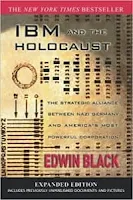“IBM and the Holocaust” by Edwin Black – Alliance of Savages
Short Summary
Edwin Black has become a celebrated thorn in the sides of many corporate and governmental entities, going to great lengths to pull their darkest secrets out from the shadows. In IBM and the Holocaust, he chronicles in minute detail how IBM co-planned and co-organized the Holocaust for the Nazis, and the unsavoury alliance which blossomed between the two.
Edwin Black Digs Up a Wretched History
Leaving aside the few brainless drones who insist the Holocaust never occurred, I think we can all agree it was without a doubt one of the most horrifying actions committed by Man against fellow Man over the course of our entire history. The whole process, however, was quite complicated to organize, and in his history book titled IBM and the Holocaust, Edwin Black details how the American corporation came in to help the Nazis in their vile endeavours.
Before moving on, I feel the need to point out this is a non-fiction history book, meaning everything Edwin Black states here is factual evidence, backed up by documentation obtained through profound research. I am aware this all sounds like some laughable conspiracy to one hearing it for the first time, but it is indeed a known fact, and Black's hard-earned reputation as a historian and investigative journalist lends his books all the credence they could ever need.
In any case, I think it's fair to say the book is more about IBM's history than that of the Second World War, especially considering the author begins by detailing the company's beginnings. We get to learn about many of its most important members, the friends and enemies they had, and perhaps most importantly, the sort of philosophy they followed and imbued the company with.
More importantly, he then places a rather intense focus on the connection IBM had with National Socialists over the course of its existence, exploring how it affected the company in its successes and future development. From there on out, the author moves closer to the Second World War and the rise of Nazi Germany, getting into the meat of the matter.
For virtually the rest of the book Edwin Black details the various ways in which IBM equipment and techniques were used to help the Nazis conduct the Holocaust, from their organization to the first census in 1933 which identified the Jews in Germany, to the card-sorting machines they later built for them. In other words, Black brings to light a truth many would like forgotten, making it all the more important for us to see it.
The Business of Human Extermination in IBM and the Holocaust
If you've previously read some of Edwin Black's books, or are have any sort of familiarity with him in general, then you'll already know that he doesn't write books to judge or spill his bias all over the reader. He is about as impartial as an author can get while diving into the darkest corners of humanity's history, an act doubly impressive considering his parents are survivors of the Holocaust.
This impartial perspective he is so proficiently able to adopt is what, I believe, makes the account he gives of IBM's history in relation to Nazi Germany so enthralling. Even though he easily could, he refrains from pronouncing judgments on people, instead focusing his energy on relaying two things to the reader: what happened, and why.
Naturally, the biggest question at the centre of IBM and the Holocaust is how the company's owner justified his actions and decisions. How could he walk hand-in-hand with some of the vilest people to have ever graced the Earth? Edwin Black largely seeks to answer it from an economical point of view, detailing just how dependent IBM was on Germany back then.
Once again, I want to reiterate that Edwin Black doesn't judge anyone or try to justify anyone's actions; such thoughts are best-left for the reader to struggle with on their own. He does, however, make a rather compelling demonstration of how factors can pile up on top of each other, leading a person down an abyss they either simply can't see, or choose to ignore for the sake of money.
In my opinion, Edwin Black's account of how a giant and powerful company got pulled into one of the most depraved and revolting episodes in our short time on Earth is one of the greatest cautionary tales about the destructive allure of wealth. From where I'm looking, I think he succeeded in demonstrating that greed is such a powerful motivator, it can rob us of our humanity at any moment... a terrifying enough thought we ought to carry close to ourselves, a warning for future generations.
Organizing Death
In addition to answering the pressing question as to why IBM would help the Nazis as a company, Edwin Black also placed quite a bit of accent on how exactly said help was provided. He takes us through the many censuses, organizational techniques and methods of documentation which IBM devised for the Nazis to help them identify Jewish bloodlines, as well as their work with statisticians for more precise numbers.
Over the course of his research for this IBM and the Holocaust, the author has managed to accrue over twenty thousand pages of technical documentation detailing virtually everything IBM helped Nazi Germany with. By his own estimated, there are about five times as many documents out there which have yet to see the light of day. It is my belief, once again, that all he presents here is pure fact and ought to be taken as such.
Now, let's digress a bit and talk about this book in terms of how entrancing it is, although it does feel to me like the topic at hand places it above such notions. Yes, there are long passages where the author expertly details an event, person, or even system, making for some relatively dry narration from time to time. However, I think the tone used by the author is perfect for the discussion of such a heavy topic as the Holocaust, and the purely factual approach is necessary when dealing with something so important and sensitive.
Additionally, it is my opinion that virtually every single person who will read this book is either preemptively captivated by the subject matter, or will be once they get into it. The mere nature of the information we are revealed here and the shocking depths to which it takes us more than make up for whatever faults the narration and pacing might have.
Ultimately, Edwin Black has done a monumental work by publishing this book, showing the true danger of capitalism, a place where morality and human decency takes a back-seat to the needs of shareholders, to the need to make more and more money... even if it means organizing death on an unprecedented scale.
The Final Verdict
IBM and the Holocaust by Edwin Black is a one-of-a-kind history book, turning over stones many preferred to leave face-down, detailing how one of America's most powerful and recognized companies helped Nazi Germany perform some of the vilest deeds in mankind's history. In my opinion, it's one part of history everyone ought to get acquainted with, if only to witness the depravity Man is capable of.
If you're in search of a history book dealing with one of the lesser-known parts of the Holocaust and are interested in learning about IBM's part in it, then I strongly urge you to witness all this book has to offer.
 | Edwin BlackPersonal site Edwin Black is an American historian, syndicated columnist, investigative journalist and author, specializing in human rights among a few other topics. Among his more influential works are The Transfer Agreement, IBM and the Holocaust, War Against the Weak, and Banking on Baghdad, having earned him numerous literary, governmental and human rights awards over the years. |








Comments
Post a Comment